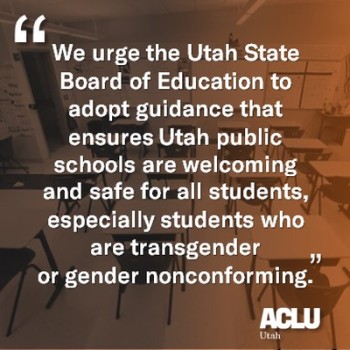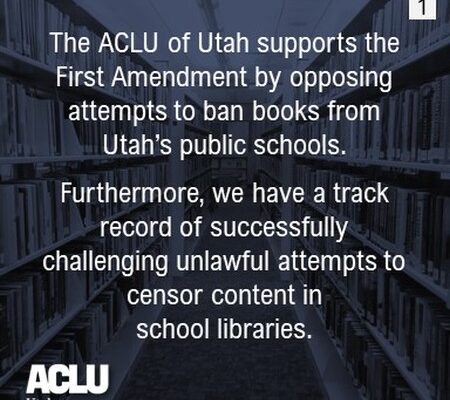Disclaimer
None of the information herein is intended as legal advice. We try to maintain our "Know Your Rights" materials to keep current. However, please be mindful of the publish date as the information described herein may not reflect recent legislation or case law that could impact your rights.
Select a Scenario
Do I have a right to learn?
Yes! In Utah, every child who is a resident of Utah has the right to a free public education. You can attend school in the district where you live. If you’re over 18 years of age and haven’t finished high school—and your class hasn’t graduated yet—you can still attend public high school free of charge.
In fact, Utah law requires students to stay in school until they turn 18, unless they qualify for certain exceptions listed in the Utah Code.
What are my rights to express myself?
- Freedom of Speech & Expression
- You don’t give up your First Amendment rights when you enter school.
- You can express yourself through your opinions, clothing, art, music, websites, and political activities.
- Schools can only limit expression if it disrupts class, threatens safety, or interferes with learning.
- Protest and Walkouts
- Since Utah law requires students to attend school, schools can discipline you for missing class.
- Schools cannot discipline you more harshly because of the message of your actions or their political nature.
- If you are facing a suspension of 10 days or more, you have a right to a formal process and can be represented by a lawyer.
- You should be given the same right to make up work as any other student who missed classes.
- Dress Codes
- Clothes are a form of self-expression, but schools may set dress codes for safety and order.
- Rules must be applied fairly and cannot target or discriminate against specific groups of students.
- Just disagreeing with a dress code usually isn’t enough to challenge it legally.
- T-Shirts & Apparel
- Schools cannot ban a shirt just because they dislike the message.
- Political speech, like a shirt criticizing the President, is generally protected.
- Schools may ban clothing with vulgar language, sexual content, or messages promoting drugs, alcohol, violence, or self-harm.
- The new law restricting Pride and other flags, HB77 Flag Display Amendments, passed in the 2025 Legislative Session does not apply to students. Students may wear apparel or accessories depicting Pride or other flags.
What are my rights if the school wants to search me?
Your Fourth Amendment Rights
- The Fourth Amendment of the U.S. and Utah constitutions protects against unreasonable searches and seizures.
- These protections apply in schools, but courts give school officials more flexibility than outside school.
- Courts balance your right to privacy with the school’s responsibility to maintain safety and discipline.
- Students often have less protection against unreasonable searches and seizures at school than elsewhere.
Interacting with Law Enforcement at School
- If questioned by law enforcement but not under arrest, students have the right to walk away calmly.
- If taken into custody (including interrogations at school), students have the right to a lawyer and should ask for one immediately.
- Students also have the right and should ask for their parent, guardian, or friendly adult to be present when in custody and being interrogated.
- Police usually need a search warrant, which is permission from a judge to search a specific area or item, based on probable cause that evidence of a crime is located within the defined area or item. A judge must sign the warrant.
- Police do not need a search warrant to search a student’s vehicle when there is probable cause that evidence of a crime is contained within it, or if the car is impounded.
Property Searches
- Schools are responsible for providing you with an education and maintaining your safety.
- School officials can search lockers, desks, parking lots, and other school grounds if they have information suggesting safety risks or rule violations.
- These searches can be based on information supplied by students, school employees, and the police.
- Students have the right to refuse consent to a search of themselves, their backpack, locker, or car.
Searches of Your Person & Strip Searches
-
-
- Strip searches are almost always unconstitutional because you have a significant right to privacy regarding your body, and strip searches are highly invasive.
- Schools must have individualized suspicion before searching a student.
- If a school official searches you without proper suspicion, the courts will weigh your privacy rights, the intrusiveness of the search, and the school’s safety concerns.
- In most cases, a school’s suspicion warrants a strip search only if officials are looking for weapons or drugs.
- Police may search you after an arrest.
-
What are privacy rights in school?
- The Family Education Rights and Privacy Act of 1974 (FERPA) generally prohibits schools from releasing personal information in a student’s education record without written consent from a legal guardian or adult (18+) student.
- FERPA also requires schools to keep a record of who asks for student information, so there should always be a paper trail.
- Directory information can be shared if, for example, the school creates a student phone directory or yearbook.
- All other information is private and confidential, meaning it cannot be released without your legal guardians’ or your own written consent if you are 18 years or older.
Are there times when my school can share my information?
There are only limited exceptions under FERPA:
- Court Order/Subpoena Exception
- Schools may release information with a valid court order or judicial subpoena.
- Note that an “Immigration and Customs Enforcement (ICE) subpoena” is not a valid judicial subpoena. (See NILC’s resource on valid vs. invalid warrants)
- In practice, if a law enforcement or ICE officer shows up with a piece of paper, the school should not hand over records until it is verified as a valid court order.
“School Officials” Exception
FERPA allows “school officials” or outside entities performing an “institutional service or function” to access student information only if:
- The official is under the direct control of the school,
- access is limited to what’s needed for a “legitimate educational interest,”
- and use and redisclosure are limited to the original purpose.
This usually pertains to teachers, counselors, or school nurses—not immigration officers. A counselor might see your records to support your education, but that information shouldn’t leave the school for other purposes.
What are my rights when it comes to being disciplined at school?
- In Utah, it is recognized that every public school student should have the chance to learn in an environment that is safe, supports learning, and is free from unnecessary disruption.
- Your local school board adopts conduct and discipline policies, which each public school must give to students when they enroll.
- These policies must be posted in plain view at the school, usually online on the district or school website.
- If the policies change, the school must update students and post the changes where everyone can see them.
What are my rights if facing discrimination, harassment, or bullying at school?
- The Fourteenth Amendment of the U.S. Constitution guarantees “equal protection under the law” to everyone in the United States, no matter their immigration status. This includes protecting students from discrimination based on race, color, nationality, ethnicity, or religion.
- Freedom of speech does not protect all types of conduct considered speech.
- Speech that rises to the level of harassment or bullying of other students is not protected and may be restricted and punished.
- Harassment and bullying are, unfortunately, common occurrences in schools. Students may experience harassment or bullying for many reasons, such as their appearance, gender, sexual orientation, gender expression, race/ethnicity, disability, religion, or social viewpoints.
- Harassment and bullying take on many forms, such as name-calling, physical violence, and sexual intimidation. They can be carried out by students or school employees towards students or school employees.
- Bullying and harassment are prohibited by Utah law on school property, as well as:
- At school-related or sponsored events;
- On a school bus or at school bus stops, and
- While traveling to a location or event
- Schools are responsible for addressing harassment and bullying to ensure that students have access to an equitable environment in which they can learn and thrive.
Can my school discriminate against a school club?
- Under the Equal Access Act, public high schools that allow “noncurriculum-related” student groups to meet on school property must give all student groups the same access.
- This means schools cannot discriminate against a group based on the religious, political, or philosophical nature of its activities.
- In Utah:
- Students must have parental consent to join a club.
- All student clubs—curriculum-related or not—must have faculty oversight.
What are my religious freedom rights in school?
Your Rights
- The First Amendment of the U.S. and Utah Constitutions guarantees the right to practice—or not practice—the religion of your choice.
- You can express your religious beliefs at school (for example, by wearing religious symbols or sharing your views) as long as it doesn’t disrupt school activities or infringe on others’ rights.
- Schools cannot show favoritism toward one religion over another, or force students to participate in religious practices.
Religion in School
- Schools may teach about religion in the context of literature, history, or culture.
- Schools may not promote religion or conduct religious activities such as prayer or devotionals.
Religion and Free Speech
- Students can pray independently or in student groups if it is voluntary, not disruptive, and does not pressure others to join.
- Prayer cannot be part of a captive audience setting (like a school assembly or graduation).
- Public school employees can neither encourage nor discourage participation in religious expression when acting in their official capacity.
- Schools may not set aside official time for prayer, even if students are told they can “opt out.”
Related Content

ACLU of Utah Comments on Gender Identity Guidance

ACLU of Utah Statement on Book Banning and the First Amendment
As Youth Head Back to School, New Laws for Youth Justice System
Stay Informed
Sign up to be the first to hear about how to take action.
By completing this form, I agree to receive occasional emails per the terms of the ACLU’s privacy statement.
By completing this form, I agree to receive occasional emails per the terms of the ACLU’s privacy statement.

